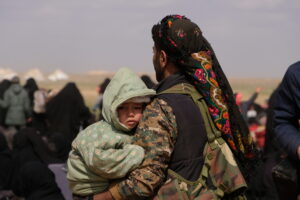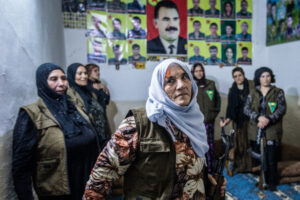Islamic State Via WhatsApp: ‘Blow Yourself Up, O Lion’
A trove of communications coming out of Islamic State plots and activity in Europe reveals a mix of direct control and improvisation. abulhussain (CC BY 2.0)
1
2
abulhussain (CC BY 2.0)
1
2
“Brother, I said smart phones: iPhone, Galaxy, laptop, tablet, etcetera.”
Sounding a bit like a frustrated gate agent at a crowded airport, the coordinator added: “Each of you can only bring one suitcase. If you come alone, just bring one suitcase. That is, a carry-on and one suitcase.”
“I didn’t understand the last thing, could you explain?”
“Brother, call me when you get to Turkey.”
In Syria, new arrivals were interviewed by Islamic State militants seated at computers, according to Western counterterror officials. The militants asked a checklist of questions including blood type, mother’s name, level of religious education, and preference for becoming a “warrior” or a “martyr,” according to copies of Islamic State intake forms obtained by ProPublica. The authenticity of the documents was confirmed by U.S. counterterror officials.
Although the culture of the Islamic State is repressive and bureaucratic, the reality on the ground can be rather anarchic. The restrictions on high-tech devices described in the Italian investigation were by no means uniformly imposed or obeyed. Militants in the self-styled caliphate have access to computers, smart phones and social media. Some have posted a barrage of messages and images, including videos of atrocities.
In response, leaders of the Islamic State have told foreign fighters to curtail their activity on social media because it exposes them to eventual prosecution back home or to being targeted in Syria. The use of social media has continued, however, according to European counterterror officials.
In fact, the cacophony of voices from Syria has been crucial to recruitment.
“In contrast to what has happened with other conflicts, the recruitment and the propaganda aren’t just in hands of the public communications apparatus,” said a counterterror chief of the Spanish police. “Each fighter has a phone and narrates his day-to-day life, his blog … A lot of these terrorists have circles of associates in Europe because they came from there, so this is effective publicity.”
Tapping into such communications, Italian police gained insight from their investigation of a family of Muslim converts from the Milanese suburb of Inzago.
Maria Giulia Sergio was 28. In September of 2014, she married an Albanian extremist she barely knew so they could join the Islamic State, according to investigators. The couple traveled with his mother to the Syrian city of Sed Forouk and met up with Albanian relatives living there, including children. The husband’s brother died in combat, according to the report.
The newlyweds encountered “numerous daily obstacles” to staying in touch with people back home because of “rigid rules imposed by the Islamic State as well as the objective technical difficulties, in a country devastated by years of civil war,” the report says. “This had a positive impact on the investigations because it had the practical effect of multiplying calls among relatives” in Italy and Albania when they heard from the militants.
Sergio talked via Skype because the suspects believed it was “more secure,” the report says. Police intercepted the conversations nonetheless. Sergio described her husband’s stint in a training camp in Iraq. She talked about child care, Koranic classes, decapitations and a stoning, and implored her family to make the “hijrah,” or pilgrimage to Syria.
“I am speaking to you in the name of the Islamic State,” she said. Scolding her father for remaining in his job in Italy, she said: “It makes no sense for you to work for them. They are the ones who must be our slaves.”
In April of last year, the parents announced they would join her. The father asked if he should bring his driver’s license and if he could buy a car in the “Caliphate,” according to the transcript.
Police arrested the suspects before they could depart.
Meanwhile, authorities across Europe struggled to intercept a smaller flow of militants traveling in the opposite direction.
Western intelligence officials estimate that the Islamic State dispatched between 60 and 180 operatives to attack targets in Europe. The strategy appears to have been to overwhelm the security forces with sheer numbers. Even if most of the strikes failed, something would eventually succeed. The results were graphically evident in France, where authorities foiled 11 attacks in 2015.
Officials say the threat has changed since the days of al-Qaida. Osama bin Laden’s group had the flexibility common to Islamist terror networks, often developing plots based on the initiative, expertise and availability of recruits who reached its secret compounds in Afghanistan and Pakistan.
Al-Qaida created a team to oversee attacks overseas. The chief plotters were Middle Easterners or Pakistanis, and they guided operatives to targets with instructions via phone and email. U.S. counterterror agencies identified external operations chiefs and eliminated a series of them with drone strikes and captures.
Today, the counterterror community is still mapping out the Islamic State’s leadership, especially those involved in foreign plots, according to the senior U.S. intelligence official.
“The structure that promotes attacks is wider and deeper, but to some degree also more autonomous, than what we saw with al-Qaida,” the official said. “It isn’t the case where we can home in on individuals and have a fair degree of confidence that if we neutralize them we will have had a considerable impact on the threat. That’s not the situation with ISIS. We had a fairly comprehensive view of the structure of al-Qaida … With ISIS, we don’t have an exact picture. It’s an intelligence collection challenge that we are working hard to address.”
The Islamic State’s top echelons are dominated by Gulf Arabs, Syrians and Iraqis, including former military and intelligence officers. Foreign fighters serve in units known as “katibas” organized by nationality and language. Large Francophone katibas field hundreds of French and Belgians, many of North African descent, and thousands of Moroccans and Tunisians. Senior foreign fighters have the resources of a quasi-state at their disposal: money, technology, identity documents, training facilities. But they are also given considerable autonomy to develop plots, officials say.
“There is … leeway to foreign fighters and operatives to choose targets and methods on turf they know best,” the senior U.S. intelligence official said. “The foreign fighters know what the organization wants to see happen and they act on it.”
The attacks on Paris in November briefly made Abdelhamid Abaaoud, a 28-year-old Belgian ex-convict, an internationally known leader of the external operations unit. He participated in the massacre and died in a police raid days later in the gritty suburb of Saint Denis. Yet some investigators now believe his stature within the Islamic State has been overstated.
“To me he was an average leader,” said Judge Trevidic, who led investigations of plots in which Abaaoud surfaced. “Have you ever seen a general on the front in Saint Denis? That is all right for a lieutenant, a captain, but not for people above. ‘’
Based in Syria, Abaaoud selected, trained and deployed jihadis to Europe in 2014 and the first half of 2015. In addition to guns and grenades, he taught trainees about secure communications — encrypted applications such as Telegram, WhatsApp and Truecrypt — and set up protocols to contact them when they were in place.
Secure communications technology has been a recurring feature in recent attacks and foiled plots in France, according to French Interior Minister Bernard Cazenueve.
“Encryption is a crucial issue,” Cazeneuve told a small group of U.S. reporters in March. “All the attacks last year used encrypted phones or computers … It is a difficult problem for us.”
(For background on the use of encryption by terrorists, read this article in the June issue of The CTC Sentinel, the monthly publication of the Combating Terrorism Center at West Point.)
Abaaoud’s operatives did not always follow security procedures, however. In June of last year, Turkish immigration authorities detained Tyler Vilus, a French plotter en route to Paris with someone else’s Swedish passport. Allowed to keep his cellular phone in a low-security detention center, Vilus brazenly sent an unencrypted text message to Abaaoud in Syria, according to a senior French counterterror official.
“I have been detained but it doesn’t seem too bad,” the message said, according to the senior official. “I will probably be released and will be able to continue the mission.”
Instead, U.S. spy agencies helped retrieve that text and French prosecutors charged Vilus with terrorist conspiracy.
In another case linked to Abaaoud in early 2014, the NSA played a central role in helping French police track down Ibrahim Boudinah, a plotter captured in a Cannes safe house as he prepared an attack with explosives and guns.
Officials said the Paris plot did not involve much long-distance direction. Instead, Abaaoud and two other field coordinators travelled separately from Syria to Europe to prepare the attack. Abaaoud entered via Greece in September, probably melting into a vast, chaotic flow of illegal immigrants that the Islamic State has used to infiltrate operatives during the past two years.
The other two leaders made their way to Budapest, where they sheltered in crowds of refugees camped out in the train station, according to Belgian prosecutors. On September 9, they were picked up at the train station by a Belgian accomplice named Saleh Abdeslam, who drove them to Belgium, prosecutors say.
The pair had different skills. Laachroui, a former electrical engineering student from Brussels, was the explosives expert. Belkaid, an Algerian petty criminal who lived in Sweden before joining the Islamic State, had more ideological preparation and religious knowledge than the others in the attack squad, officials say.
In Brussels, the duo set up a remote command post in a safe house and coordinated the Paris operation by phone. The gunmen and bombers used a number of disposable cell phones during the attacks. Although police reconstructed the activity of a phone found near the scene of the attack on the Bataclan concert hall, plotters exchanged encrypted messages before the attacks that French intelligence could not detect, according to Interior Minister Cazenueve.
Afterward, the coordinators in Brussels made calls and wired money to help Abaaoud, who was on the run, rent the shabby apartment north of Paris where police eventually killed him. Intercepted calls suggested that Laachroui and Belkaid “had some rank or influence,” a senior Belgian counterterror official said.
Laachroui and Belkaid became targets of a massive manhunt along with Abdeslam, the lone surviving attacker from Paris, and several other accomplices. They were sheltered for four months in Brussels by networks based on clan, ethnicity and criminality and ruled by a code of silence. Police monitored at least 89 phones. An intercept picked up ominous chatter.
“It was possibly Saleh [Abdeslam] or an associate,” the Belgian counterterror official said. “He’s saying: ‘The cops are chasing me. Things are hot here. We are going into action.’ And the voice in Syria says: ‘Yes, go into action.’ But there wasn’t intelligence of a precise plan.”
That snippet of intelligence was among the leads that prompted Belgian authorities to shut down their capital for five days in November. But the attack didn’t happen for a while.
During the next four months, the bombmaker Laachroui stayed in close contact with the Islamic State using encrypted methods, principally Telegram, according to Western counterterror officials. The fugitives also communicated with Syria and each other using WhatsApp, Skype and the mobile application Viber on devices including laptops, tablets and phones, counterterror officials said.
Laachroui exchanged audio recordings and text messages with Abu Ahmed, a French-speaking “emir” of foreign fighters in Syria, counterterror officials said. Investigators believe Abu Ahmed was based in Raqqah, the Islamic State’s headquarters, and that he also played a role in overseeing the Paris plot.
It’s not clear if Western intelligence officials have identified Abu Ahmed yet. Several veteran French jihadis in Syria are suspected of overseeing external operations. They include the converts Fabien and Jean-Michel Clain, brothers from Toulouse (Fabien Clain is believed to have issued the Islamic State’s claim of responsibility for the Paris attacks); Boubaker el Hakim and Salim Benghalem, Parisian veterans of a cell that first waged jihad in Iraq in 2004; and a blond convert known as Abu Sulayman al Fransi, described as a former physical education teacher and father of two.
At one point, Laachroui told Abu Ahmed there were tensions among the fugitives in Brussels, according to officials.
“They were squabbling,” the Belgian counterterror official said. “They told the emir: ‘We have split up. We were arguing before. It’s better now.'”
As Laachroui worked with TATP, a highly volatile explosive, in his hideout in the Schaarbeck neighborhood, he asked Abu Ahmed for technical help from bomb experts in Syria.
“He has them check different mixtures and adjusts his work based on what they tell him,” the Belgian counterterror official said.
The fugitives and the emir discussed potential plans including a massive attack with 600 kilos of explosives that did not take place. The goal was to wait and strike France again in hopes of disrupting or cancelling the month-long Euro 2016 soccer championship scheduled to begin in June, according to counterterror officials.
European spy agencies and their allies in the United States and Britain deployed the full weight of their sophisticated technology in the search for the plotters. But neither the NSA nor Britain’s Government Communications Headquarters (GCHQ), spotted the digital footprints, officials said.
“Everyone was trying to find these guys,” the senior French counterterror official said. “They were able to elude us. But they were able to elude the Americans, too, and that shows you what a problem encryption is.”
Police work on the ground produced a breakthrough on March 15. A forgery investigation turned up fake identity cards used to rent apartments. Police went to what they thought was an abandoned safe house near a Renault factory in the Forest neighborhood.
The raiders used a hand-held battering ram on the door. They discovered Belkaid aiming an AK–47 at them. The firefight wounded him and several investigators, who tumbled down a flight of stairs seeking cover. A SWAT team finished off Belkaid. Police found the cache of ammunition for AK–47 rifles—and DNA traces of Abdeslam, who had fled while Belkaid held off the officers.
The bad news reached Laachrooui, who sent the urgent message to Syria. Abu Ahmed told him just to use bombs, and the fugitives decided to hit Belgium rather than France because time was running out. Once again, the Islamic State let them decide targets and timing, counterterror officials say.
On March 22, Laachroui and another suicide bomber blew up at the Brussels airport. A third bomber struck at a subway station. Thirty-five people died and more than 300 were wounded.
It could have been worse. Two other bombers lost their nerve and fled. The improvised nature of the attack raises the possibility that it might not have succeeded without the guidance from afar.
Airstrikes and battlefield losses have intensified pressure on the Islamic State. It has become more difficult for plotters to enter Europe illegally and for recruits to reach Syria, counterterror officials say.
But terror groups often accelerate attacks abroad in response to defeats at home, as reflected by a recent flurry of strikes in Turkey, Iraq and Bangladesh.
An Italian investigation this year gives glimpses of a changing landscape. The chief suspect was Abderrahim Moutaharrik, a Moroccan immigrant living north of Milan with his wife and two children. A professional kickboxer, he was so radical that he posted a photo of himself in the ring wearing a t-shirt with the Islamic State logo, investigators say.
Moutaharrik and his associates used WhatsApp extensively, according to a 72-page Milan prosecutor’s report dated April 19, 2016. The police secreted microphones in homes and cars and implanted mobile devices with spyware, the report says.
Moutaharrik idolized Mohamed and Osama Koraichi, brothers fighting for the Islamic State. His desire to emulate his friends increased after Osama died in an air strike in Iraq last year. Moutaharrik sang jihadi anthems and ranted about killing infidels in front of his four-year-old son, the report says. His wife obtained a bank loan of $7,800, allegedly to finance their imminent move to Syria.
But there were problems. Mohamed Koraichi was difficult to reach and couldn’t find the family a smuggler in Turkey.
On March 15, Moutaharrik finally received an audio message from Koraichi via WhatsApp from an Indonesian phone in Syria. They discussed the kickboxer’s hopes of making the pilgrimage.
On March 20, Moutaharrik received another WhatsApp message from Syria. But this time a new voice addressed him by name: a high-ranking militant who spoke flowery classical Arabic. He wanted the kickboxer to wage jihad right away.
The “sheik” said the Islamic State was under attack by “Christian” armies from “bases in your homes, European bases,” according to the transcript.
“You must take revenge on them, revenge for the Muslims,” the sheik said. Praising “lone-wolf” operations, he continued: “in the Christian nations, one operation gives more satisfaction than dozens of bombs … You will be among those who do this good deed in the lands of the Christians, in Rome, in Italy … ”
“We will take revenge,” Moutaharrik replied, according to the transcript. “God willing here they will only know massacres and killings.”
The police went on red alert. Suicide bombers struck Brussels two days later. Moutaharrik and his wife celebrated, according to transcripts. The sheik and Koraichi urged the increasingly agitated kickboxer to attack right away.
Italy “is the capital of those who carry the cross, my brother,” Koraichi said. “Until now there hasn’t been any operation done [in Italy], know that if you do an attack it is a great thing.”
On April 8, the sheik sent a soliloquy that he titled “Bomb Poem.” It evoked images of fire, suicide bomb belts, and Islamic battalions “annihilating the infidels.”
Police arrested Moutaharrik and three other suspects 11 days later.
ProPublica is a Pulitzer Prize-winning investigative newsroom.
Your support matters…Independent journalism is under threat and overshadowed by heavily funded mainstream media.
You can help level the playing field. Become a member.
Your tax-deductible contribution keeps us digging beneath the headlines to give you thought-provoking, investigative reporting and analysis that unearths what's really happening- without compromise.
Give today to support our courageous, independent journalists.






You need to be a supporter to comment.
There are currently no responses to this article.
Be the first to respond.